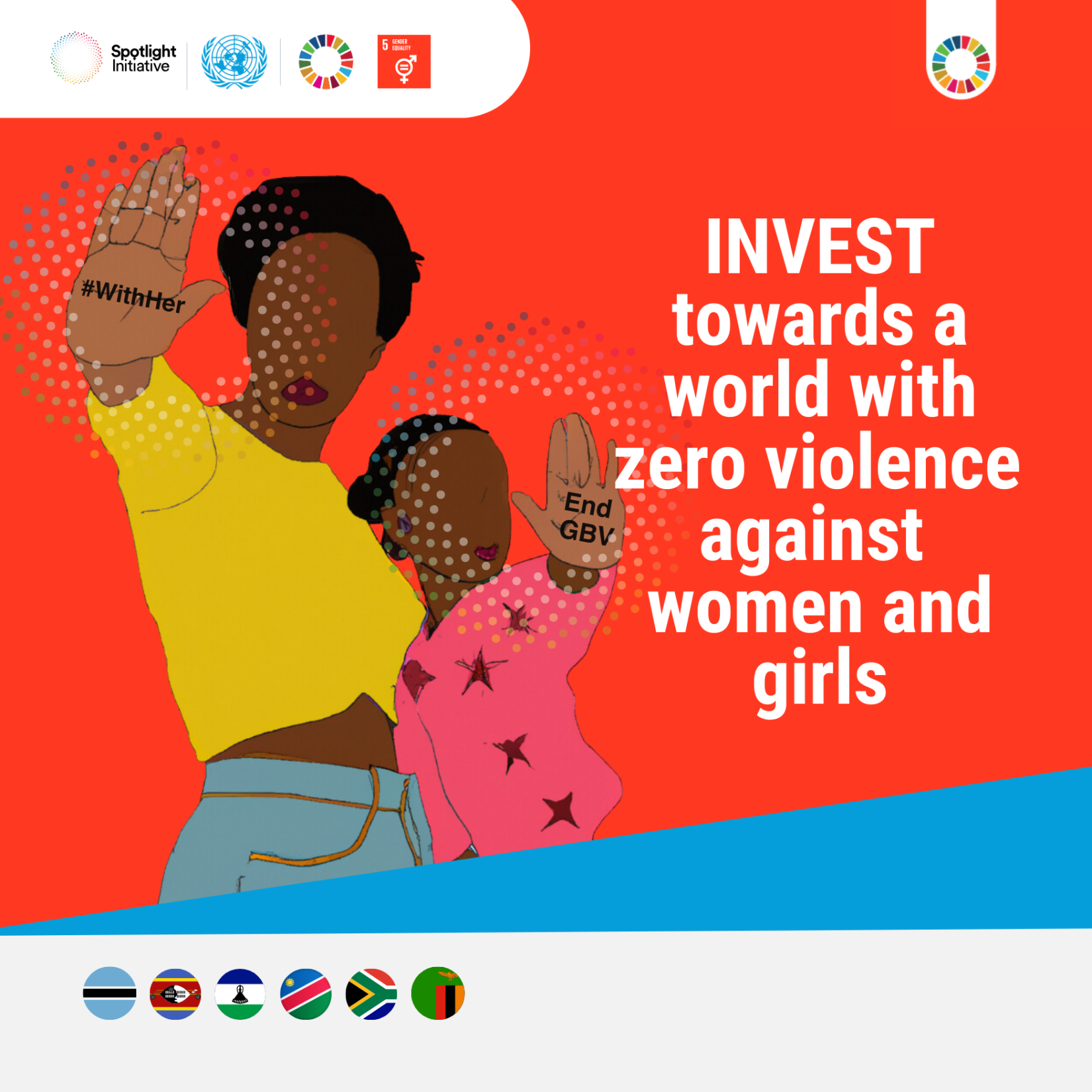Pretoria - The United Nations in six southern African countries – Botswana, Eswatini, Lesotho, Namibia, South Africa and Zambia – in collaboration with the Spotlight Initiative, gathered at a roundtable in Pretoria, South Africa, to launch a five-year programme aimed at ending Gender-Based Violence (GBV) in the subregion. The prevalent alarming levels of GBV, particularly violence against women, girls, and children, in southern Africa has necessitated a comprehensive and collaborative approach to combat this crisis.
The main objectives of the roundtable were to emphasize the importance of a scaled-up, collaborative, and comprehensive sub-regional approach and present the four-pillar framework for the five-year programme; align with governments, garner stakeholders buy-in, engage with prospective donors and partners, and advocate and mobilize support and resources for the fight against GBV in the region.
Collective attendance (in person and virtual) was over 300 participants including high-level officials from government, development partners, the African Union Development Agency (AU-NEPAD), the Southern African Development Community (SADC), private sector, civil society, and the UN. South African Minister in the Presidency for Women, Youth and Persons with Disabilities, Dr. Nkosazana Dlamini Zuma, participated in the event as well as Her Majesty Queen Masenate Mohato Seeiso of the Kingdom of Lesotho who joined online. The UN Resident Coordinators in the six countries co-chaired the meeting: (Botswana) Zia Choudhury; (Lesotho) Amanda Khozi Mukwashi; (Eswatini) George Wachira; (Namibia) Hopolang Phororo; (South Africa) Nelson Muffuh; and (Zambia) Beatrice Mutali.
In her framing remarks, the UN Resident Coordinator in Lesotho highlighted that peace was the cornerstone of a gender-based violence-free society. “Many women do not enjoy peace as a concept or as a lived experience in their lifetime. The future must be one where women and girls can know what peace is from the privacy of their homes to the global grandstands of governance and economic participation,” she said.
Welcoming participants to the roundtable, the UN resident Coordinator in South Africa quoted the UN Secretary-General Antonio Guterres, who said, "Gender-based violence is an ongoing emergency in its own right." Mr Muffuh emphasized that achieving SDG 5 required a whole-of-society collaboration and the collective efforts of civil society, donors, development partners, and governments across Southern Africa. He highlighted the need to mobilize resources for the sub-regional programme to end GBV and strengthen the UN’s resolve and commitment to accompany the efforts of government to ensure the wellbeing of the planet and shape the lives of countless number of people, particularly women, young people, and children.
Her Majesty the Queen Lesotho extended her support to the initiative and emphasized that it is a moral responsibility for all to dismantle the structures and beliefs perpetuating violence and discrimination in our communities. In her keynote address , Dr. Dlamini Zuma called for the creation “of an environment where young girls are skilled and educated. A world where women have access to the economy and access to finance like men. We have to create an environment where women can be free." She highlighted the critical need to empower women and eliminate their dependence on men for survival.
Dr. Dlamini-Zuma also emphasized the importance of engaging and securing the full support of men, community leaders, and parents. She pointed to the need for behavioral change. . Senior government officials from the six countries also participated in the discussions, both in person and online and shared their commitments to tackling the scourge of GBV.
The SADC region holds some of the highest rape cases in Africa, highlighting the urgency of the event. The roundtable showcased the determination to kickstart the movement to end GBV in the region in alignment with the Sustainable Development Goal (SDG) 5 on gender equality as it forms the bedrock of the UN’s commitment to achieving the SDGs.
The Spotlight Initiative (2017-2023) is the world's largest targeted effort to invest in gender equality as a precondition and driver for the achievement of the SDGs.
The roundtable featured six sessions, each playing a pivotal role in addressing GBV.
Leading the session on Donor and Partner Inputs to the Joint Programme, Mr. Choudhury of Botswana emphasized the importance of the Spotlight initiative and UN’s experience, adding, “Partnerships between diverse stakeholders is critical to achieve any sustainable development goals. Gender-based violence is a complex and multi-dimensional issue which requires an ‘all of society’ approach, as well as meaningful involvement of the affected. Governments, NGOs, civil society, academics, private sector, the media, donors, and GBV survivors are among the many actors that need to work together to end GBV.”
Donor representatives expressed their commitment to collaborate with the countries to support the fight against GBV. They acknowledged that the region will only be able to achieve SDGs and the Agenda 2030 if all partners work together, avoid competition and silos.
The roundtable provided an interactive platform for participants to share their experiences and insights. Activists like Sandra Zaca, a GBV survivor who turned to advocacy, shared her inspirational journey. Similarly, Her Royal Highness Chieftainess Mambo Kawaza talked about efforts to combat child marriage and support victims.
Ms. Hopolang Phororo, UN Resident Coordinator to Namibia stressed that “the culture of silence continues and if we do not break the silence, GBV continues to be swept under the rug and perpetuates the cycle. Shame, guilt and self-blame fuel the silence, so GBV programmes such as the one we are discussing should encourage safe spaces, where victims can share their experiences freely.”
Representatives from the diplomatic corps, international development partners, the private sector, civil society, and the UN family all contributed to the discussions. The message was unequivocal; all partners agreed that addressing GBV is imperative. What remains is the provision of the necessary resources, both technical and financial, to support this cause.








